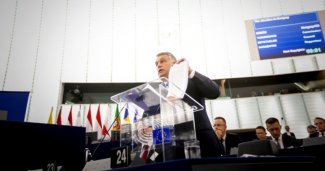Procedure under article 7 triggered against Hungary

On 12 September, the European Parliament brought a motion with a two-thirds majority to the Council stating the risk of a serious breach of EU values by Hungary. In doing so, the MEPs launched the article 7 procedure of the Treaty on European Union according to which the Council, by unanimous decision, may suspend a member state’s Council voting rights. In the adopted resolution, the European Parliament pointed to twelve issues concerning Hungary that provoked its concerns, including: the functioning of the constitutional and electoral systems; corruption; the independence of the judiciary; freedom of expression and religion; academic freedom; minority rights and the fundamental rights of migrants and refugees. The parliament’s resolution was passed with support from left-wing factions, the liberal ALDE party, the Green Party and most of the MEPs from the European People’s Party. Votes against the resolution were cast by a majority of MEPs from: European Conservatives and Reformists, Europe of Freedom and Direct Democracy, Europe of Nations and Freedom. Also a majority of independent MEPs took the Hungarian side and voted against.
In response to the vote, the Hungarian government stated that this was the ‘revenge of pro-immigration politicians’ for Budapest’s refusal to accept migrants. Prime Minister Viktor Orbán concluded that the background for the parliament’s decision was the attempt made by the French president and the German chancellor to deprive the member states of control of their borders and hand over control to EU institutions. In Orbán’s opinion, France and Germany wants the external Schengen borders to be guarded by EU ‘mercenaries who will let migrants in.’ At the same time, Budapest is arguing that there is a raft of errors in the report on the rule of law in Hungary developed by a Dutch MEP from the Green Party on which the parliament’s resolution was based. The Hungarian government also claims that many of the objections mentioned in the report concern issues which have already been cleared up in dialogue with the European Commission or which are still being discussed. Furthermore, Budapest has challenged the outcome of the vote itself, claiming that the resolution was not passed by a two-thirds majority as required in the Treaty on the Functioning of the European Union because the votes of those MEPs who abstained were not taken into account. The legal service of the European Parliament is of the opposite opinion. Referring to the Parliament’s Rules of Procedure and the practices applied so far, it pointed out that legal acts in the European Parliament are as a rule approved and rejected by a majority of votes without taking abstentions into account. Hungary has announced that it will contest this decision at the Court of Justice of the European Union.
Commentary
- Prime Minister Viktor Orbán and his loudest critics (mainly left-wing and liberal forces) are engaged in the debate concerning law and order in Hungary in the spirit of the campaign for the election to the European Parliament scheduled for May. Both parties have demonstrated that they want to mobilise the voters through polarisation of the European political scene and for this purpose are presenting their opponents as a threat to the future of the EU. The level of this polarisation minimises the chance of achieving a compromise by member states in issues of key importance for the EU ahead of the European elections (including the next Multiannual Financial Framework, and the Dublin IV Regulation).
- One effect of the polarisation of views in the EU ahead of the election is the dispute inside the European People’s Party (EPP), which Hungary’s governing party Fidesz belongs to. The EPP has for years protected Viktor Orbán’s party from attacks in the European Parliament. During that time, Fidesz would demonstrate a readiness to partly withdraw from some reforms criticised in the EU (including constitutional amendments). However, Fidesz’s third consecutive sweeping victory in the parliamentary election in April this year has undermined Budapest’s will to make further concessions with regard to its EU partners. Instead of this, Orbán has resorted to harsh rhetoric on the EU forum that until recently was reserved for the domestic audience. At the same time, as the European election draws closer, critics of Orbán’s policy inside the EPP are becoming increasingly louder. Recently this part of the EPP has been pushed for by Manfred Weber, the leader of this faction in the European Parliament and the deputy president of Bavaria’s CSU which co-operates closely with Fidesz. Finally, 57% of MEPs from the EPP who cast their votes backed the resolution criticising Hungary (29% were against and 14% abstained from the vote).
- There are strong demands to expel Fidesz from the European People’s Party or suspend its membership rights. On the other hand, the Hungarian prime minister has received encouragement, for example, by the leader of Italy’s Northern League, Matteo Salvini, to form a new faction in the European Parliament. Orbán has readily played on this topic for many months because this allows him to play the role of the leader of anti-immigrant forces in the EU. There are many signs that Orbán, without refraining from using harsh anti-immigrant and anti-establishment rhetoric, will try to remain in the EPP at least until the European election scheduled for next May. Hungary’s prime minister hopes that the election to the European Parliament will strengthen the nationalist-conservative faction inside the EPP and anti-immigrant forces in the European Parliament as a whole. However, it is uncertain whether this scenario will be implemented because the numerous British representation (a majority of whom took Hungary’s side) will not be present in the new European Parliament. In addition to this, some parties which promote views similar to Fidesz’s slogans, such as Austria’s ÖVP led by Chancellor Sebastian Kurz, in the vote inside the European Parliament took a clearly critical stance regarding the rule of law in Hungary. Therefore, unless Orbán’s supporters clearly strengthen their position in the European Parliament after the election, it is likely that he will adopt once again the tactic of a constructive politician ready to make symbolic concessions to maintain his previous position in the EPP.
- It should be expected that the dispute over the rule of law in Central European countries will escalate in the coming months. Upon the motion from the Green Party faction, in October the European Parliament will analyse the condition of the rule of law in Romania in the context of changes adopted and implemented in the judiciary system and anti-corruption structures there. The European Commission has also made it clear that it intends to continue the disputes with member states concerning the rule of law and, if necessary, address the disputed issues to the Court of Justice of the European Union. The factors that contribute to the escalation of the East-West European dispute include not only the campaign ahead of the European election but also negotiations of the Multiannual Financial Framework for 2021–2027. Among the issues, that played an important role in the criticism of Budapest and the launch of proceedings under article 7 of the Treaty on European Union have been allegations concerning the creation of a new oligarchy by the Hungarian government which is gaining strength due to the embezzlement of EU funds. Some of the countries which are net contributors to the EU budget will most likely use the issues of the threat to the rule of law and corruption as an argument for making cuts in cohesion policy after 2020.
Photo credit: ©European Union 2018 - Source: EP




